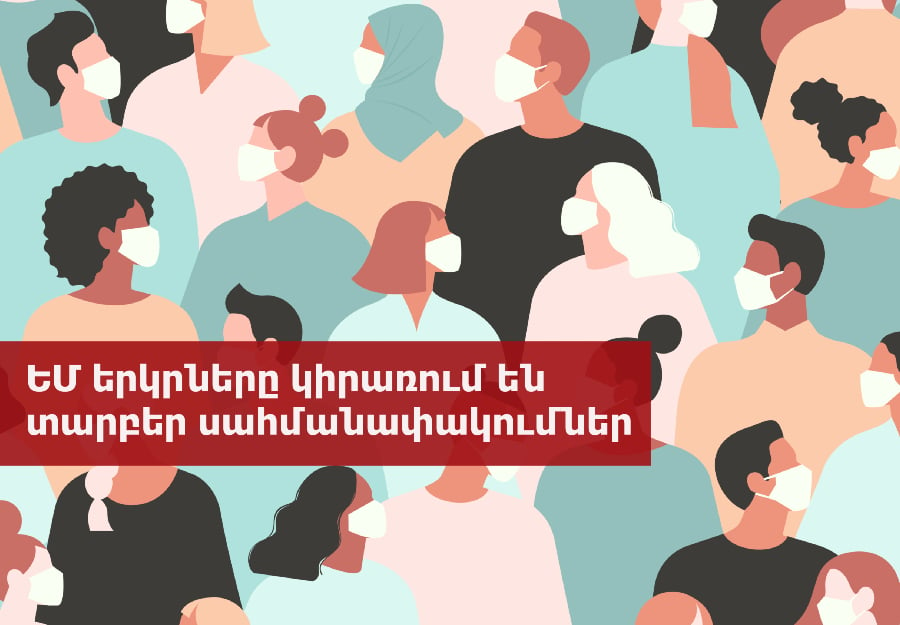Armenia has been on the list of high-risk countries in terms of the pandemic since October 29.
The Embassy of the Netherlands in Armenia issued a statement on October 28 that new rules have been set for travel from Armenia to the Netherlands. The reason is the deteriorating epidemic situation day by day.
“For some people, there is a ban on entering Europe, not allowing them to go to the European Union or the Schengen area. Entry to the Netherlands is allowed if the purpose of the trip meets the criteria considered an exception,” the statement said.
Examining the whole package of restrictions, we see that the first important precondition is to be fully vaccinated. This means that the ban will apply to the unvaccinated.
On October 29, media outlets and social networks quoted the embassy as saying that “from today, people from Armenia are banned from entering the EU due to the coronavirus.” The news was spread under this headline by armlur.am, panorama.am, pilitik.am, lurer.com, armdaily.am (the headline was changed), medianews and others.
The reason for this information is that the EU has agreed on general approaches to restrict free movement to ensure safe travel. A traffic light system has been introduced, which classifies countries according to their epidemiological situation. Different EU member states impose strict restrictions on high-risk countries, even those who have been vaccinated. However, all the same, the information being spread that the doors of the EU are closed to Armenia are only partly true, as not all countries apply the same restrictions. Each country decides for itself what anti-epidemic policy to pursue.
Let’s try to understand the anti-epidemic policy of EU member states for those at high risk.
Italy
The Italian government has set 5 different levels of countries depending on the epidemic situation. Before being in the high-risk zone, Armenia was at level D. In other words, it was possible to avoid 5 days of mandatory self-isolation by providing a vaccination certificate or a negative test result. We are now at level E, i.e. entry is allowed in exceptional cases, tourist destinations are not among them.
Austria
Access to Austria is very limited for high-risk countries. As a rule, entry here is allowed for medical and educational purposes. In such a case, it is necessary to submit a negative result to the PCR test 72 hours before entering and to be isolated for 10 days, which can be interrupted if you pass a test with a negative result on the 5th day.
Belgium
In Belgium, a special ban is imposed on those who have spent 14 days in very high-risk countries. However, the latest update mentions that such a country does not exist yet. Armenia is not one of the countries with a very high risk, people can go to Belgium if they provide a certificate of full vaccination, moreover, at least two weeks must have passed since the second dose. If Armenians are not vaccinated with vaccines adopted by the EU, then permission can be obtained in special cases for educational, medical, and work purposes. The complete list can be found here.
France
Since June 2, France has been operating in three categories of countries: “green” (the virus is not actively circulating and there are no dangerous variants of the virus), “orange” (the virus is actively circulating within controlled limits), “red” (the virus is actively circulating. there are dangerous variants). Armenia is still not on the list of countries in the Red Zone after the most recent update, although several countries from the region have already appeared: Turkey, Georgia, Russia, Iran.
Armenia is ranked among the “orange” countries. This means that if citizens are not vaccinated, their entry into France is practically ruled out. However, if there is an entry permit, you must submit a negative test result or proof of recovering from the coronavirus infection within the last 6 months. In this case, you should isolate yourself for at least 7 days. If you are vaccinated, you can travel to France without restrictions. However, it is important that Armenia has just appeared in the high-risk zone and no updates have been made on the website of the French Foreign Ministry yet. To get the final picture, you need to wait for fresh information.
Denmark
Fully vaccinated persons from high-risk countries can enter Denmark without additional restrictions (testing and self-isolation). Of course, the vaccine must be approved by the European Medicines Agency. These vaccines are Pfizer BioNTech, Johnson & Johnson, Moderna, AstraZeneca.
Latvia
Even having a negative PCR test within 72 hours or proof of immunization with a vaccine (QR-code) recognized in the EU, people from Armenia cannot enter Latvia without good reason. Carriers, merchant sailors, foreign diplomats, students (if there is a written confirmation of a higher education institution), athletes, and those traveling for medical purposes can travel to Latvia from high or very high-risk countries. The full list is here. In case of obtaining a permit, 10-day self-isolation is mandatory for those leaving Armenia, which may be interrupted on the 7th day after a negative test result.
Germany
As a rule, to go to Germany requires either a negative test result, or a certificate of vaccination, or a document on infection-recovery. Citizens of high-risk countries should be isolated for 10 days, but they can take a test on the 5th day and come out of self-isolation in the case of negative results.
Thus, the claim that people from Armenia are barred from entering the EU is partly incorrect, as not all countries apply strict restrictions to high-risk countries.
Ophelia Simonyan







